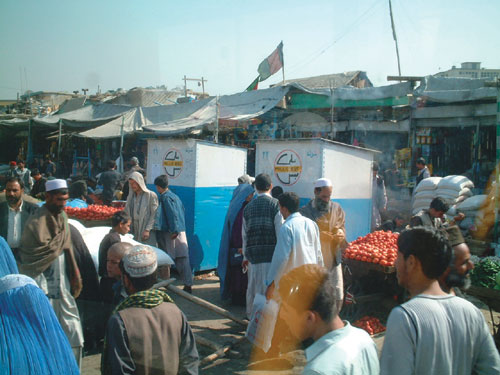Japan's Official Development Assistance White Paper 2005
Main Text > Part II ODA DISBURSEMENTS IN FISCAL YEAR 2004 > Chapter 2 Details and New Policies about Japan's ODA: Striving for Further ODA Reforms > Section 2. Measures for Each of the Priority Issues > 4. Peace-building > (2) Afghanistan
(2) Afghanistan
Since its economic and social infrastructures and its basic system of governance were destroyed due to civil conflicts that lasted over 20 years, Afghanistan has been continuing its efforts to rebuild a new nation. Japan, as well as other countries in the international community, holds the perspective that efforts to rebuild and pacify Afghanistan will lead to the peace and stability of the entire world, as well as the eradication and prevention of terrorism. At the International Conference on Reconstruction Assistance to Afghanistan (Tokyo Conference) hosted by Japan in January 2002, it was announced that over US$4.5 billion would be extended by the entire international community and that Japan would offer a maximum of US$500 million over the following two and a half years. In addition to this, Japan showed its active stance toward providing reconstruction assistance to Afghanistan at the following International Conference on Afghanistan (Berlin Conference) held in April 2004, by announcing its intension to extend an additional US$400 million over the following two years until March 2006. As of the end of July 2005, Japan has implemented approximately US$922 million in assistance.
Japan has been providing assistance in the three areas of peace process, domestic security, and reconstruction based on the "Consolidation of Peace" initiative, which was announced in May 2002 by then-Minister for Foreign Affairs Yoriko Kawaguchi on the occasion of her visit to Afghanistan. Specifically, assistance has been provided with emphasis on such areas as DDR (Disarmament, Demobilization and Reintegration), preparations for election, support for its media, support to administrative expenses, landmine removal, and infrastructure development (development of main highways, etc.). Japan is playing a leading role especially in the process of DDR, which allows for smooth progress in the reconstruction efforts. In March 2005, Japan extended a grant aid for conflict prevention and peace building to implement, through UNDP, Afghanistan's New Beginnings Programme, which supports the Afghanistan Transitional Administration in carrying out the DDR process. The progress of the DDR process has been highly regarded not only by the Afghan government but also by the international community. By July 7, 2005, approximately 60,000 soldiers were disarmed and demobilized. Furthermore, the Regional Comprehensive Development Assistance Programme (the Ogata Initiative), which has been implemented based on the proposal made by then Special Representative of the Prime Minister Sadako Okada upon her two visits to Afghanistan, is highly regarded as an endeavor that presents a model for regional reconstruction assistance and promotes uninterrupted transition from humanitarian assistance to reconstruction and development.
Japan's reconstruction assistance is wide-ranging. In FY2004, in the area of infrastructure development, the "Project for Construction of the Terminal of Kabul International Airport," and other projects were implemented through grant aid cooperation, while in the area of education, the "Project for Construction of Basic Education Facilities" was implemented through grant aid in order to ameliorate the situation in which an extreme shortage of schools resulted in two- or three-part class systems. Furthermore, a project related to the preservation, restoration, and utilization of monuments at the cultural heritage site of Bamiyan is being planned, and preservation and restoration works have been made on murals on cave walls.
In October 2004, the world witnessed Afghanistan's presidential election successfully held with the support of the international community, including Japan. Afghanistan will continue its nation-building efforts in the future under the leadership of President Karzai, who was newly elected under the democratic process. Japan will continue to extend its active cooperation to support the self-help efforts of the Afghan government to rebuild its nation.

Symbolic bus stops of the restoration placed in the city of Kabul
Column 8 Report from Afghanistan on Disarmament, Demobilization, and Reintegration of Ex-combatants (DDR) — Counselor in Charge of DDR in the Japanese Embassy in Afghanistan, Yuichi Inoue


 Next Page
Next Page